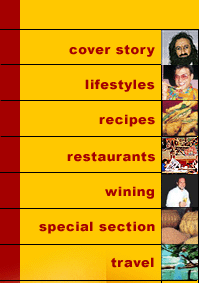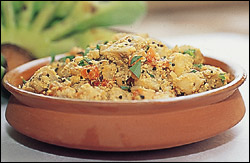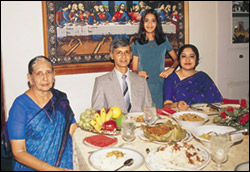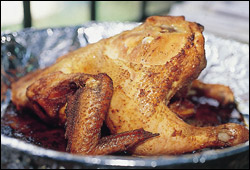


|
Continued...
Like Shivalli Brahmins Sanjay and Anita Rao, Karnataka�s biggest dealers for Maruti, Telco and Bajaj automobiles, who stay in a posh bungalow on Mangalore�s busy Falnir Road. The family has been in the auto business for decades and Sanjay is one of Mangalore�s most promising car rallyists, his living room walls are lined with trophies he collected along the way, and in his garage waiting for him in readiness for the next rally is his prized Maruti Gypsy. They are Brahmins and the food they eat is purely vegetarian, minus the onion and garlic of course. Wife Anita, who is not a Mangalorean but comes from Delhi, tends to favour the modern kitchen built as an attachment to the old Rao bungalow. But when they get serious about cooking, then Sharda, the old lady of the house, takes over.
Sharda has been with the Raos for centuries, and she looks it as well. In the old, traditional kitchen that opens up into a backyard where there are coconut and banana plantations, and a deep stone well,
In the central part of the city, on Church Road and next to the Hoige Bazar, is the ancestral home of Felix and Louella Albuquerque, better known as the Mangalore Tiles family. The tiles company is only one of their businesses, otherwise they are agriculturists and promoters of commercial and residential apartments. Mangalorean Christian cuisine is not unlike the food of the other communities, except for the introduction of beef and pork. There is an excellent Pork Baffad that Mrs. Albuquerque makes that she claims can send the Goan Sorpatel to the back of the class. She uses a wet masala for the pork, it has plenty of onions, approximately four for one kilo of meat, garlic, lots of red chillies, some green chillies as well, ginger, garlic, mustard, jeera, pepper, coriander, cloves, cinnamon, bay leaf. The pork is got from reliable sources. Mangalore has excellent piggeries and a porker is put to the chopper ever Sunday, the Albuquerques say. The old lady also prefers beef to mutton. She says the beef stew she makes comes lighter than when she cooks it with mutton. But fish is her favourite food. Mangalorean Christians enjoy a Baked Mackerel or a Mackeral Rechad, and a very popular prawn and green mango curry. There are several recipes for country chicken as well.
|

Home Page
 Sharda hand-grinds all the day�s masalas on a stone. Her stove is fuelled by wood that is chopped in the backyard. She�s a perfectionist, the Raos say proudly of the old family retainer, and they describe her rasam made of 13 different masalas as being simply amazing. This Shivalli Brahmin family has meals made up mainly of rice and rice products, they
do a variety of dosais which are had with sumptuous vegetarian stews and coconut milk curries made of drumstick, brinjal, potato, raw banana, tomato, mango, cucumber, raw jackfruit, and dals of bengal gram, tangy rasams, spicy sambars. Sharda even grinds a variety of chutneys with mango, dry coconut, colocasia leaves, coriander and potato to go with the food. The Raos also talk highly of her Holige, a Puran Poli-like sweet, but infinitely more sticky
and with a longer
shelf-life.
Sharda hand-grinds all the day�s masalas on a stone. Her stove is fuelled by wood that is chopped in the backyard. She�s a perfectionist, the Raos say proudly of the old family retainer, and they describe her rasam made of 13 different masalas as being simply amazing. This Shivalli Brahmin family has meals made up mainly of rice and rice products, they
do a variety of dosais which are had with sumptuous vegetarian stews and coconut milk curries made of drumstick, brinjal, potato, raw banana, tomato, mango, cucumber, raw jackfruit, and dals of bengal gram, tangy rasams, spicy sambars. Sharda even grinds a variety of chutneys with mango, dry coconut, colocasia leaves, coriander and potato to go with the food. The Raos also talk highly of her Holige, a Puran Poli-like sweet, but infinitely more sticky
and with a longer
shelf-life.
 Their home is among the oldest in Mangalore, it is 130 years old, and it is a home of broad stone walls, solid wooden doors and windows, Mangalore tiled roof, naturally, and a kitchen with an outhouse that overlooks a garden. The culinary expert at this Mangalorean Christian home is Felix's elderly mother. Give her fish and give her meat (as Old King Wenceslas said in the Christmas story) and old Mrs. Albuquerque gets into action. She hand-grinds her masalas, too, and her base for them is always coriander, jeera, onion and coconut. She says she boils the ingredients before grinding them (whatever that means) and this brings a different flavour to the final product.
Their home is among the oldest in Mangalore, it is 130 years old, and it is a home of broad stone walls, solid wooden doors and windows, Mangalore tiled roof, naturally, and a kitchen with an outhouse that overlooks a garden. The culinary expert at this Mangalorean Christian home is Felix's elderly mother. Give her fish and give her meat (as Old King Wenceslas said in the Christmas story) and old Mrs. Albuquerque gets into action. She hand-grinds her masalas, too, and her base for them is always coriander, jeera, onion and coconut. She says she boils the ingredients before grinding them (whatever that means) and this brings a different flavour to the final product.
 Which is not to suggest that there is no vegetarian food in Mangalorean Christian cuisine. There is, like the gherkin, ladyfingers, long beans, ash-gourd, bamboo shoot and green banana. These are cooked with a vegetarian masala powder that is commercially bought. Unless the vegetables are used in a stew with the beef or with mutton (there is a popular Mutton Wedding Stew which is a thin coconut-based curry). Mrs. Albuquerque relies a lot on fresh toddy for her cooking. She uses this when she makes Sannas (which are like Idlis, only lighter and fermented with toddy) and aapams. The desserts of this community are more Western than Mangalorean, so the Chinagrass and Souffles can be discounted, but not the rice pudding made of raw and fine rice that is ground with jaggery and cooked in ghee with cashewnuts.
Which is not to suggest that there is no vegetarian food in Mangalorean Christian cuisine. There is, like the gherkin, ladyfingers, long beans, ash-gourd, bamboo shoot and green banana. These are cooked with a vegetarian masala powder that is commercially bought. Unless the vegetables are used in a stew with the beef or with mutton (there is a popular Mutton Wedding Stew which is a thin coconut-based curry). Mrs. Albuquerque relies a lot on fresh toddy for her cooking. She uses this when she makes Sannas (which are like Idlis, only lighter and fermented with toddy) and aapams. The desserts of this community are more Western than Mangalorean, so the Chinagrass and Souffles can be discounted, but not the rice pudding made of raw and fine rice that is ground with jaggery and cooked in ghee with cashewnuts.